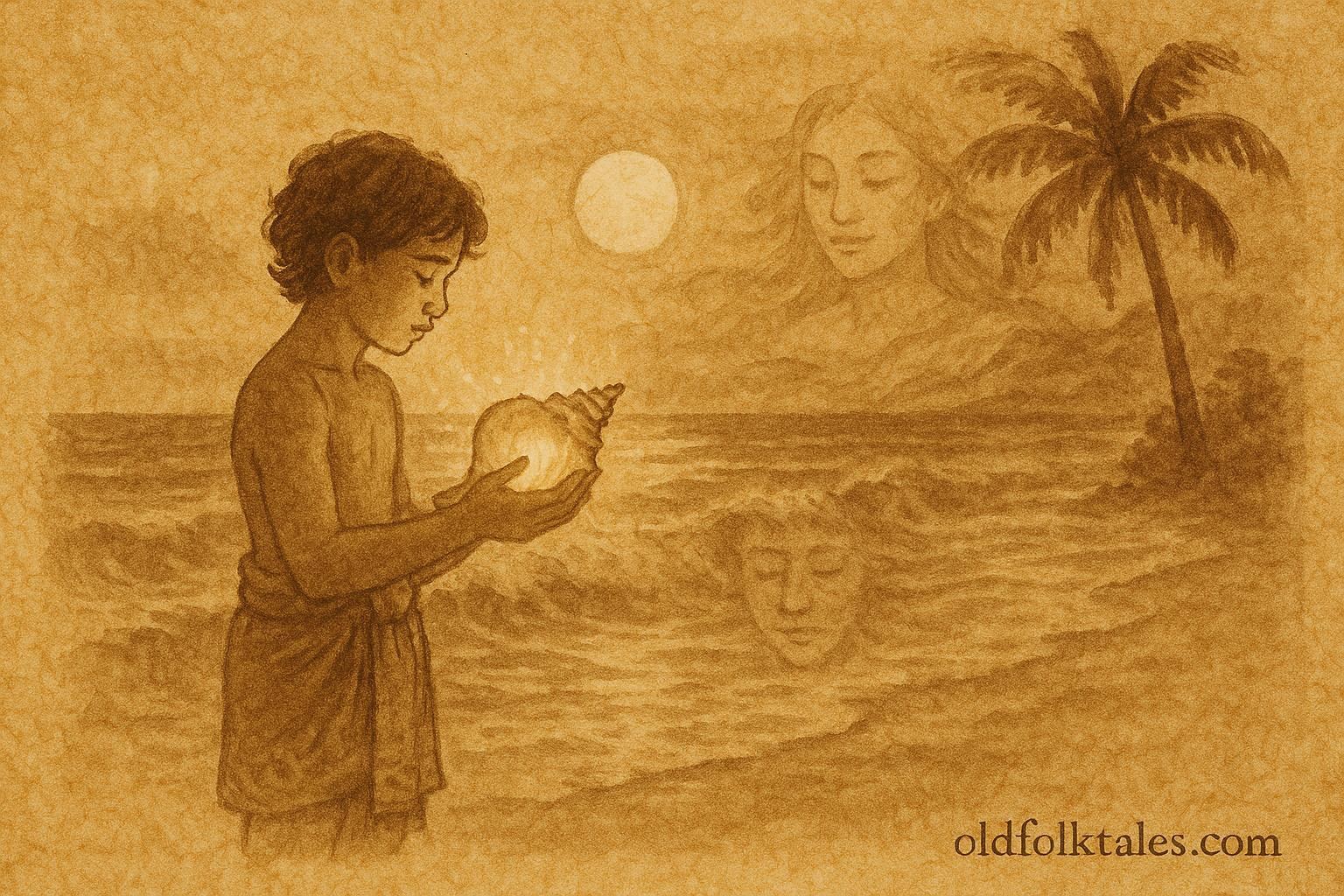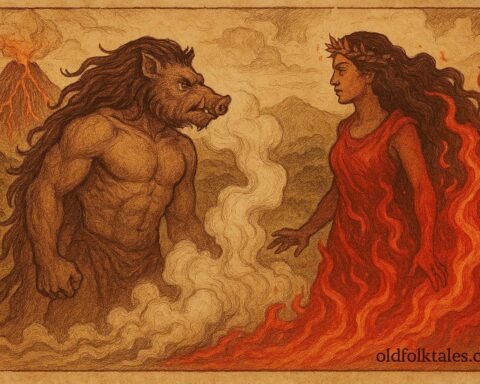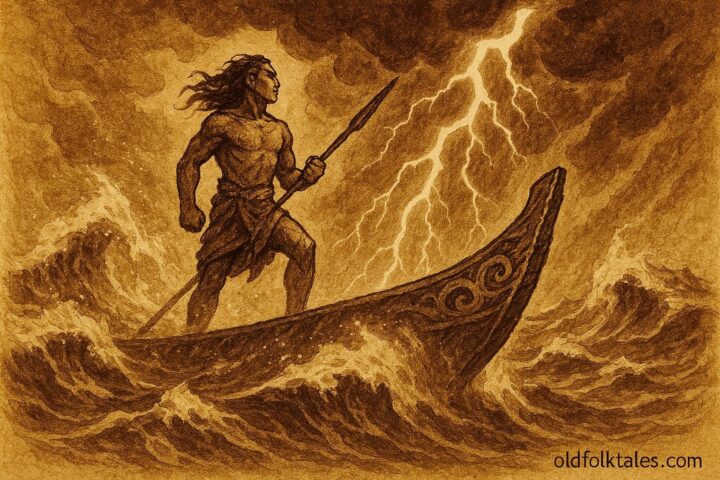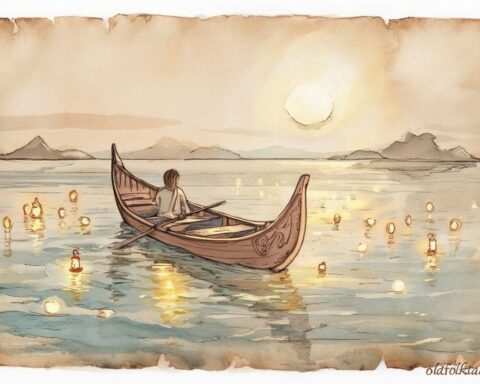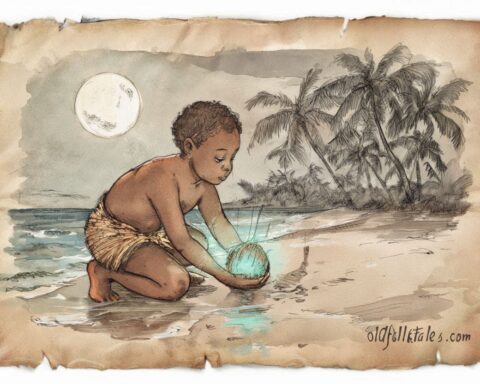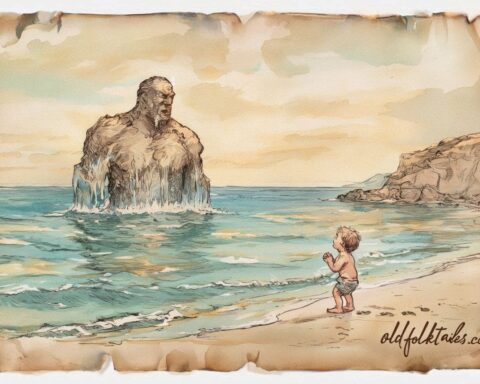Long ago, in a small coastal village in Samoa, there lived a boy named Tanu, who had eyes as dark as the depths of the ocean and a spirit as restless as the tides. The sea was both his playground and his teacher, its waves his lullabies, its winds his whispers. But despite the beauty of his island home, Tanu carried a deep sorrow in his heart. His mother, Sina, had passed away when he was just a child, leaving behind only her songs and the memory of her laughter carried by the wind.
Tanu’s father was a fisherman who rose before dawn each day to cast his nets. Though he loved his son, grief had closed him off, and words between them were few. So Tanu spent most of his days wandering the shore, searching the sands for anything that might remind him of his mother.
Sail through the legends of brave navigators, ocean spirits, and island gods
One evening, as the sun dipped into the horizon and painted the lagoon with gold, Tanu noticed something glimmering beneath the receding tide. He waded into the water and lifted from the sand a large conch shell, pale pink with a spiral that seemed to sing of hidden worlds beneath the waves. When he held it to his ear, he did not hear the usual rush of the sea, but a soft voice calling his name.
“Tanu,” it whispered, “my son.”
Startled, he dropped the shell. The voice faded, but the air shimmered around him as though the sea itself breathed. Trembling, he picked it up again.
“Do not be afraid,” the voice said. “I am with you.”
It was his mother’s voice.
That night, beneath the thatched roof of his hut, Tanu listened to the shell once more. The voice sang the lullabies he remembered from childhood, the same melodies his mother had sung when the storms howled. Her song told of the ocean’s wisdom, of stars that guided voyagers, and of courage that lived in the hearts of those who listened to the waves.
From that night on, the conch shell became Tanu’s dearest companion. Each evening he would sit by the shore, and the shell would sing. It taught him how to read the stars, how to feel the wind’s direction, and how to sense the moods of the sea. The villagers noticed how he seemed to know when storms were coming and when the fish would rise. They began to call him Tanu o le Tagi o le Sami, “Tanu of the Sea’s Song.”
Years passed, and Tanu grew into a strong young man. His father, now old and weary, watched in awe as his son steered his canoe with uncanny skill. Tanu had become a navigator, guiding fishermen safely through treacherous waters and leading expeditions between the islands. But wherever he went, he always carried the conch shell around his neck, bound in a cord of woven pandanus leaves.
One moonless night, while sailing across a wide stretch of ocean, a violent storm struck. The winds howled, waves towered, and the stars vanished. His companions panicked, but Tanu gripped the conch shell tightly to his chest.
“Mother,” he whispered, “show me the way.”
Through the roar of thunder came a faint melody, soft but clear. It was the same song his mother had sung in the shell. Tanu closed his eyes and listened. The rhythm of the waves matched the song’s cadence, and he turned the canoe in time with its beat. Slowly, the storm began to ease, and as dawn broke, they found themselves near the familiar cliffs of their home island.
The others hailed Tanu as a hero, but he said nothing. He simply pressed the shell to his ear and smiled.
Years later, when Tanu grew old, he would tell the children of his village, “The sea is alive, and it remembers those who listen.” Before his death, he placed the conch shell on the shore and said, “Let it sing to others who have lost their way.”
The next morning, the shell was gone, carried away by the tide. Some say it still drifts through the Samoan waters, whispering songs of courage to sailors who dare to listen.
Moral Lesson
Love and wisdom endure beyond death. Through the bond between mother and child, and between people and the sea, we learn that true guidance comes from listening, with the heart as well as the ear.
Knowledge Check
- Who was Tanu, and what was his greatest sorrow?
Tanu was a Samoan boy who lost his mother, Sina, at a young age, leaving him lonely despite his love for the ocean. - What magical object did Tanu find on the beach?
He found a conch shell that spoke in his mother’s voice, guiding and comforting him. - How did the conch shell help Tanu as he grew older?
It taught him the songs of the sea, the navigation of stars, and the courage to face storms, helping him become a master navigator. - What lesson does the story of Tanu teach about Samoan beliefs?
It reflects the Samoan reverence for ancestors, nature, and the ocean as living, spiritual forces. - What happened when Tanu prayed to the shell during the storm?
His mother’s voice sang to him, guiding him and his crew safely home through the darkness. - What is the symbolic meaning of the talking shell?
It symbolizes ancestral wisdom, eternal love, and the connection between the human spirit and the living sea.
Source: Adapted from Samoan Folktales and Legends collected by Te Rangi Hiroa (Sir Peter Buck, 1930).
Cultural Origin: Samoan folktale, Samoa (Polynesia).
